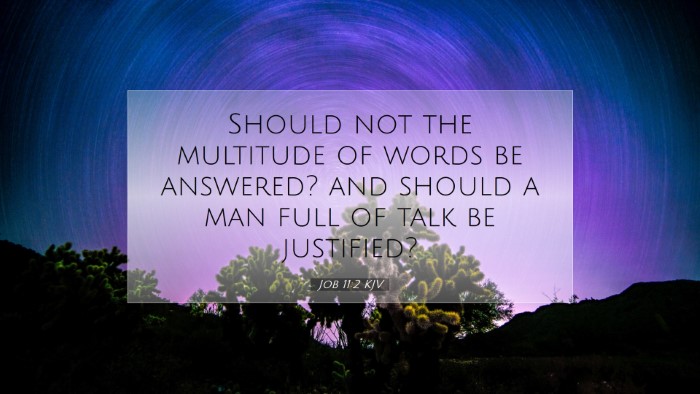Old Testament
Genesis Exodus Leviticus Numbers Deuteronomy Joshua Judges Ruth 1 Samuel 2 Samuel 1 Kings 2 Kings 1 Chronicles 2 Chronicles Ezra Nehemiah Esther Job Psalms Proverbs Ecclesiastes Song of Solomon Isaiah Jeremiah Lamentations Ezekiel Daniel Hosea Joel Amos Obadiah Jonah Micah Nahum Habakkuk Zephaniah Haggai Zechariah MalachiJob 11:2
Job 11:2 KJV
Should not the multitude of words be answered? and should a man full of talk be justified?
Job 11:2 Bible Commentary
Commentary on Job 11:2
Verse: "Should not the multitude of words be answered? And should a man full of talk be justified?"
Introduction
Job 11:2 captures the essence of the dialogue between Job and his friends, particularly focusing on the rebukes of Zophar, one of Job's three friends. This verse reflects the tension between human understanding and divine wisdom, and it raises significant questions regarding the nature of speech in the context of suffering and justification before God.
Verse Exegesis
The context leads us to a critical exploration of the rhetorical questions posed by Zophar. The Hebrew word used here for "multitude" emphasizes an abundance and overflowing of words, indicating a rhetorical urgency in Zophar's speech.
Analysis of Key Phrases
- "Should not the multitude of words be answered?"
- This phrase suggests the futility of excessive speech without substance. Zophar implies that Job's ramblings require a decisive and corrective answer.
- "And should a man full of talk be justified?"
- Zophar challenges Job's self-justification. The implication is that verbosity does not equate to righteousness or understanding. It posits a vital moral reflection on how one's words reflect their inner character.
Insights from Public Domain Commentaries
Matthew Henry's Commentary
Henry emphasizes that Zophar's harsh words underscore the danger of speaking too much, especially in situations where profound suffering is present. He notes that the multitude of words often indicates a lack of real insight or understanding. Henry posits that unnecessary speech in times of trial can obscure true wisdom and distract from practical solace. Instead of quiet empathy, Zophar's excessive words become a barrier to comfort, showing how speech can both heal and harm.
Albert Barnes' Commentary
Barnes provides a more theological reflection on the implications of Zophar's challenge. He stresses that human arguments against Job's justification arise from a limited understanding of God's nature and the complexities of divine justice. Barnes argues that the answer to Zophar’s questions is multifaceted; human speech can never fully articulate God's ways. This call for restraint highlights that while humans can express anguish and disbelief, they must also approach divine matters with humility, being aware of the great chasm between human wisdom and God's omniscient perspective.
Adam Clarke's Commentary
Clarke points out the moral inconsistency in Zophar’s attitude, stating that those who are 'full of talk' are often guilty of a self-righteousness that blinds them to their own faults. Clarke emphasizes that in asserting Job's guilt without sufficient evidence, Zophar falls into the trap of presumption, often associated with overzealousness in doctrine. Clarke’s insights encourage a deeper contemplation of how our speech reflects our character and often reveals the fault lines in our theology.
Theological Reflections
This verse challenges the reader to consider the power and responsibility of speech. In the landscape of suffering, the use of words can either build up or destroy. Pastors, students, and theologians are compelled to reflect on how unnecessary verbosity can dilute the profound truths of the faith. Moreover, Job's plight serves as a lens through which to examine God's proximity to suffering humanity despite the cacophony of human voices clamoring for understanding.
Applications for Contemporary Ministry
In ministerial contexts, Job 11:2 offers vital lessons:
- Encouraging Silence and Listening: In situations of suffering, active listening may often be more beneficial than speaking.
- Promoting Authenticity: Leaders should guide discussions toward genuine expressions of pain and seek to validate experiences rather than rush to offer platitudes.
- Teaching Wisdom in Speech: Educating congregations about the significance of thoughtful speech, echoing the Proverbs, which frequently advise on the power of words.
Conclusion
Job 11:2 serves as a poignant reminder of the complexities of human speech in the face of divine mystery. The dialogue between Job and Zophar reveals essential truths about human limitation, the perils of self-righteousness, and the need for humility. For pastors, scholars, and theologians, this verse not only encourages reflection on their own communication but also fosters a greater reliance on the quiet wisdom of God in times of trial.


